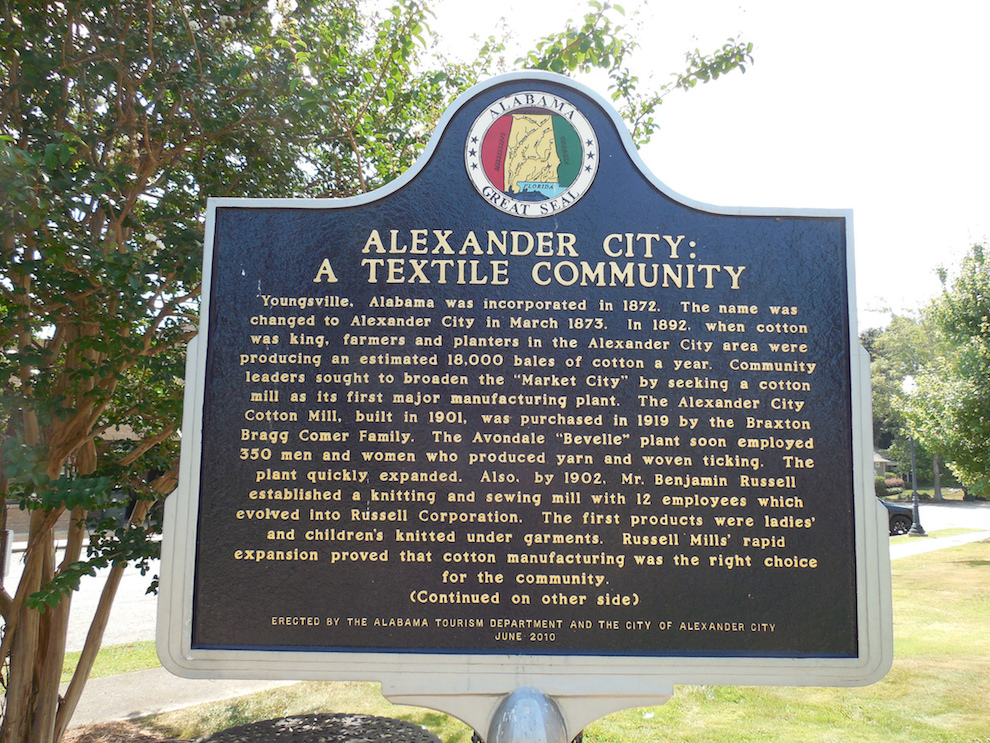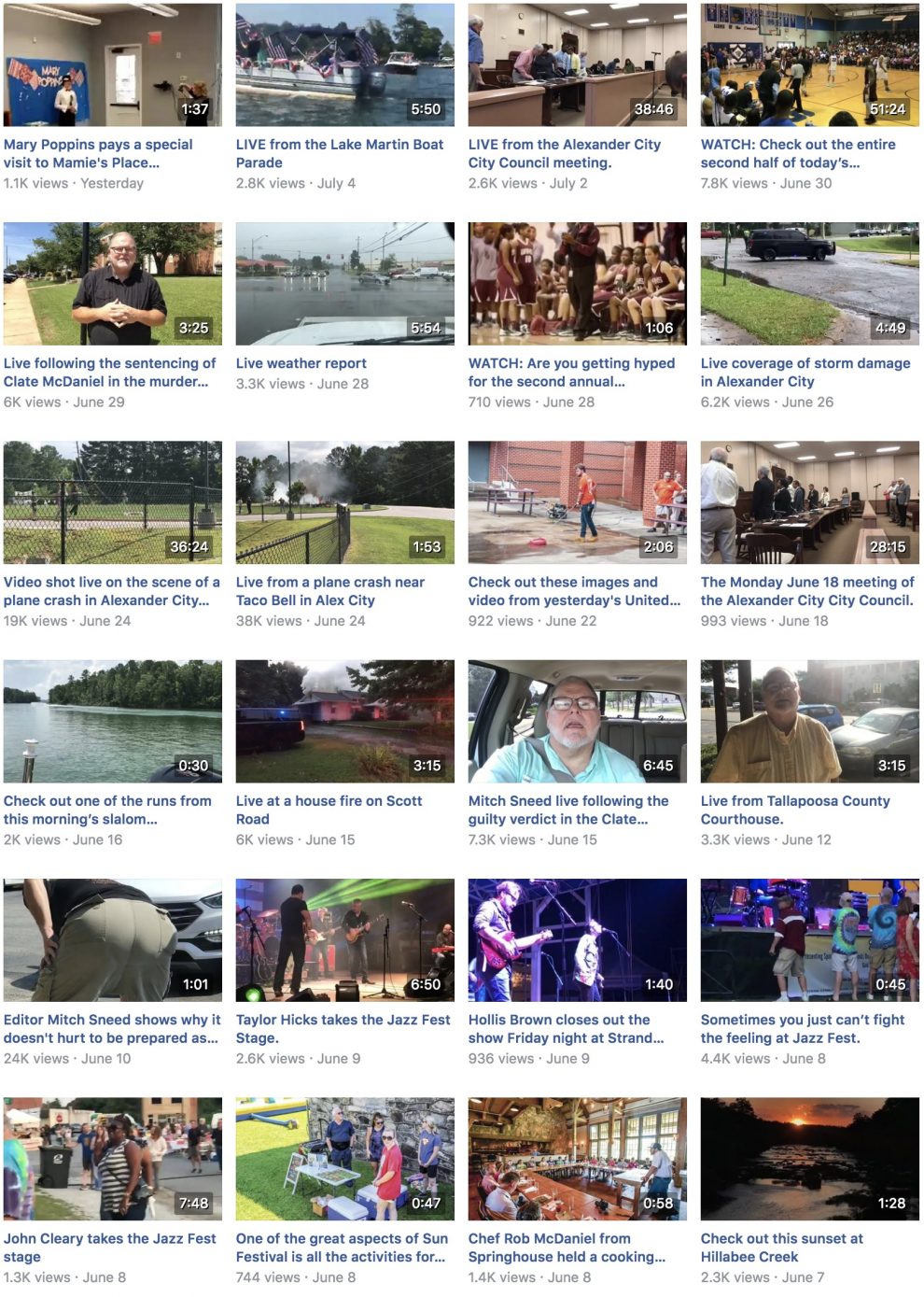
Digital advertising has, broadly speaking, been a disappointment for American newspapers. From 2013 to 2017, digital ad revenue for newspapers increased only about 8 percent — only barely beating inflation. (Meanwhile, overall digital ad spending — dominated by Google and Facebook — more than doubled over the same period.)
But in the Alabama Piedmont, the Alexander City Outlook, print circulation of around 3,250, somehow managed to boost its digital ad revenue more than 80 percent in 2017 — from $56,000 to $104,000, Editor & Publisher reported recently. So how did the paper do it?
Alexander City is a town of 14,773 people. While in many respects “Alex” City is just another small town outside of the more metropolitan city of Montgomery, the town newspaper, with a staff of three full-time reporters plus a managing editor, is anything but.
(Tragically, after I started reporting this story, The Outlook’s editor Mitch Sneed — whose voice you’ll hear in the videos in this article — was killed when his pickup truck, stopped at a light, was hit from behind by a car July 2. He was 57 and had been the paper’s editor since 2014. You can read more about him here, here, and here. “Mitch Sneed was the heart of the newsroom,” the paper’s Santana Wood wrote. “He’s been the pulse of every news team that’s had the privilege to have him on it. Exemplifying journalism down to its very core, he was everything a journalist should be and more.”)
Scott Hardy, The Outlook’s digital marketing coordinator, attributes its digital growth to a mixture of internal transformation and external turmoil in the town. (Last year, the Southern Poverty Law Center settled a suit against the city and the police chief for creating debtors’ prisons. A councilman got into a fist fight with the mayor. The council had to elect a new police chief, a new fire chief, a new city finance director…)
But first, Steve Baker — who had an extensive background in newspaper publishing and digital sales, including as publisher of the Capital Journal in Pierre, South Dakota — was brought in to lead the newspaper in 2016. It wasn’t as if The Outlook had been struggling: The traffic numbers for the website were strong, and so were engagement levels on Facebook. Baker wondered what they could do to capitalize on that.
Hardy, who had been working on digital part-time, advanced to the position of full-time digital coordinator, bringing camera experience and interviewing skills to video. Angela Mullins, The Outlook’s business manager, researched and found new tools for the newsroom to use on a budget. Mobile reporting is relatively cheap, and video on Facebook proved to be a huge part of boosting revenue. While other papers have seen Facebook news traffic declining, The Outlook’s main audience can still be found on that platform, where its videos regularly get thousands of views. (Not bad for a town of 14,000.) The new sports editor, Lizi Arbogast, was hired in part for her videography work.

“People just jumped on board with skills they had outside of their job descriptions,” Baker said, emphasizing the team effort.
“We happened to come in at a time where there was so much turmoil [in Alexander City],” Hardy, who is also a city council member, said. The people of Alex City were hungry for news, “so they were looking to see where The Outlook was going to print what was happening.”
To chalk up The Outlook’s accomplishments entirely to timing, however, is to underestimate the creativity that went into the expansion. The Outlook solicited a local marina to sponsor its coverage of the local bass fishing tournament. Pregame features for football proved to be big moneymakers for The Outlook. (Alex City has produced no fewer than 10 professional football players, including soon-to-be Hall of Famer Terrell Owens.) With an app called Switcher Studio, the paper was able to use multiple iPhones (which staff already had on hand) to film the same event on Facebook Live, while also throwing a sponsor’s logo over the broadcast. That also helped The Outlook provide something that the local radio and TV station couldn’t: live and immediate coverage not limited by commercial breaks or highlight reels.
The Outlook has always had a strong brand in print, Baker said. “But think about when you go to the restaurant, and everyone’s sitting across from one another on their phones. We wanted to reach everybody.” According to Mullins, 75 percent of traffic to The Outlook’s website now comes from mobile devices.
Tippy Hunter, the paper’s director of advertising, emphasized that during live broadcasts, videos, or any other multimedia piece, The Outlook’s print edition is always promoted throughout the piece. The video is a teaser; for a viewer to get the full story, “They’ll need to go and pick up an Outlook tomorrow.”
In the future, Baker hopes to up their technical game, showing full-sized commercials on video feeds and using lower-thirds for interviews. The Outlook also launched an in-house digital ad agency that’s positioning itself to be the go-to for any marketing solutions people in the area might need.
“We’re a part of Boone Newspapers,” Hardy said, naming the publisher that owns or manages over 80 other small properties across the country, “Hopefully, we’re laying the blueprint for something that can be implemented throughout our countrywide source of papers.”
Hunter was optimistic about the paper’s big plans, and said something not often heard in journalism: “The beauty of it all is if everyone’s got the passion, the revenue sort of follows.”